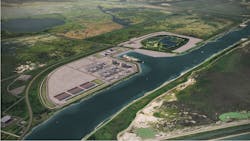Sempra Infrastructure Partners LP, a Sempra subsidiary, reached a positive final investment decision (FID) for the development, construction, and operation of the 13.5-million tonnes/year (tpy) Port Arthur LNG Phase 1 project in Jefferson County, Tex.
Port Arthur LNG Phase 1 is permitted and expected to include two 6.75-million tpy liquefaction trains, LNG storage tanks, and associated infrastructure. Total capital expenditures for Phase 1 are estimated at $13 billion. A similarly sized Port Arthur LNG Phase 2 project is under active marketing and development.
A final notice to proceed under the project's engineering, procurement, and construction agreement with Bechtel Energy Inc. has been issued. Commercial operations for Train 1 and Train 2 are expected in 2027 and 2028, respectively.
The long-term contractable capacity of about 10.5 million tpy is fully subscribed under binding long-term agreements with ConocoPhillips, RWE Supply and Trading, PKN ORLEN SA, INEOS, and ENGIE SA, all of which became effective upon reaching FID.
Interest sales
In addition to FID, Sempra closed its joint venture with an affiliate of ConocoPhillips whereby the affiliate acquired a 30% non-controlling interest in the project, is purchasing 5 million tpy of LNG offtake under a 20-year agreement, and is managing the project's overall natural gas supply requirements (OGJ Online, Nov. 23, 2022). ConocoPhillips also will have certain rights to participate in future expansion projects in both equity and offtake.
Sempra also agreed to sell a 25-49% indirect, non-controlling interest in the Port Arthur LNG Phase 1 project to an infrastructure fund managed by KKR. Sempra Infrastructure will retain certain economic and other rights with respect to the interest being transferred while granting KKR certain minority interest protections.
Sempra Infrastructure is targeting 20-30% of indirect ownership interest in the project, subject to the closing of the KKR sale, which is subject to regulatory approvals and other customary closing conditions.
